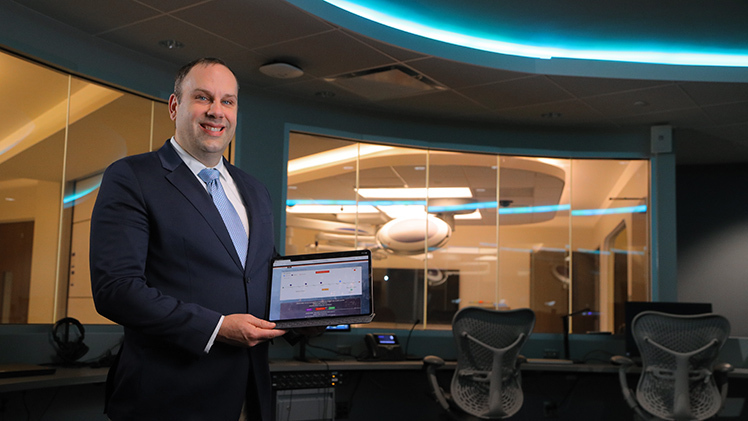Technology under development at The University of Toledo could soon help U.S. military medical personnel better prepare for treating battlefield injuries and operating in high-stress, remote environments.
“Military healthcare providers often work in extreme conditions, treating critically injured patients,” said Dr. Scott Pappada, an associate professor and director of research in the Department of Anesthesiology. “Ensuring their operational readiness is a matter of life and death, but current methods don’t effectively measure preparedness.”

Dr. Scott Pappada, an associate professor in the Department of Anesthesiology, recently secured a $1.1 million award from the Department of Defense’s Congressionally Directed Medical Research Program to spearhead development of an AI-driven assessment platform to ensure military healthcare professionals are mission-ready.
Pappada recently secured a $1.1 million award from the Department of Defense’s Congressionally Directed Medical Research Program to support the development and evaluation of a new platform designed to evaluate the operational readiness of military healthcare professionals before deployment.
By pairing expert human observers with machine learning and artificial intelligence, the platform will analyze a healthcare provider’s decision-making, actions, biometric data and even speech during simulation-based training to generate a real-time report providing an assessment of their readiness in terms of knowledge, communication skills and procedural tasks.
From that, the platform can help determine when and how much additional training is needed to ensure healthcare providers are fully prepared for real-world combat scenarios.
“The goal is to identify when to deliver just-in-time training or refreshers based on individual needs,” Pappada said. “Currently, there’s no standardized way to assess whether someone has the correct mix of skills and knowledge for high-stakes situations. This platform will help identify potential gaps in readiness and provide real-time actionable feedback.”
The study also will research and model skill decay — the loss of critical knowledge or abilities when not regularly practiced — by multimodal assessment over time and recommending targeted training as needed.
The newly funded project builds off Pappada’s prior work on PREPARE, a multimodal assessment platform he and his team developed at UToledo in 2017 to improve data-driven assessment of simulation-based education.
That software, which relies on standardized data and measurements to track the proficiency of learners, has been used extensively for medical training at UToledo.
“PREPARE laid the groundwork for what we’re building now, which is a far more advanced and more flexible platform for providing real-time evaluation based on a wide range of data sources,” Pappada said. “We’re also able to adapt it for military-specific scenarios, including combat casualty care.”
The team also is working with industry partners to develop on-demand virtual training capabilities that can be accessed even in deployed environments where high-fidelity simulations may not be available.
UToledo is collaborating with Virginia Tech, University of Illinois Urbana-Champaign, Children’s Hospital of Philadelphia, Biomojo LLC, and military personnel from Brooke Army Medical Center and the U.S. Air Force’s 59th Medical Wing at Joint Base San Antonio on this project.
“The challenge with current medical education is that it’s one-size-fits-all,” Pappada said. “In reality, military healthcare professionals face unique challenges in combat zones that require adaptive and individualized training. This project aims to fill that critical gap.”
The team hopes the initiative will ultimately provide a scalable solution for improving the readiness of military medics as the military health system prepares to meet the needs of future operating environments and deliver life-saving care for wounded, ill and injured service members.
Disclaimer: This material is based upon work supported by the United States Army Medical Research Acquisition Activity under Contract No. HT942524C0073. Any opinions, findings and conclusions or recommendations expressed in this material are those of the author(s) and do not necessarily reflect the views of the USAMRAA.